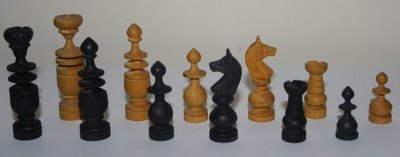
You just can't make up this kind of stuff. From the New York Times:
"On a day in which no game was played, Silvio Danailov, the manager of Veselin Topalov of Bulgaria, sent a letter to the appeals committee of the match detailing what he said were an excessive number of bathroom breaks — more than 50 per game — by Vladimir Kramnik of Russia." For the rest of the saga read here.
Topalov showed up for game 5 (with complaints) but Kramnik's demand to have his bathroom unlocked was not met and thus he forfeited game 5. Topalov gains a point so the score is now Kramnik 3 and Topalov 2.
At least the match will now get the media coverage it has been missing! There's no such thing as bad publicity after all :-)
Friday, September 29, 2006
Bathroom Break Scandal to End World Chess Championship?
Posted by
Rook Van Winkle
at
9:20 AM
0
comments
![]()
Labels: Chess News, World Championship
Tuesday, September 26, 2006
Rook Takes First Place in OTB Tournament!
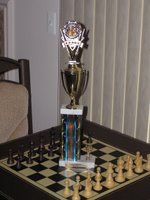 In 1979 I took first place with a 4-0 finish in the 1979 Beginners/Unrated section in the 2nd Annual Pontiac Open Chess Tournament. That was my first and only tournament experience until just a few months ago.
In 1979 I took first place with a 4-0 finish in the 1979 Beginners/Unrated section in the 2nd Annual Pontiac Open Chess Tournament. That was my first and only tournament experience until just a few months ago.
History repeats itself. On Saturday, September 16th, twenty-seven years later, I took first place 4-0 (shared with another 4-0 finisher) in the "All the King's Chessman's" Beginner's Unrated Chess Tournament. Unlike last time where I only got a cash prize, this time I did get a trophy! (See picture).
To be fair, the pairings worked in my favor. Although there were four or more adults entered, in rounds 1-3 I was paired with a novice teenager, a 5-year old, and a 10-year old. In the last round I played board 2 against an adult player. Since my game finished quickly, I had an opportunity to view board 1. I'm pretty certain if I had been paired with either player from board 1 they would have trounced me - it was obvious by the way they played they were very experienced chess players.
Here is my winning game from the last round:
Opening "Scandinavian (Center Counter) Defense"
ECO "B01"
White "James M. (Rook Van Winkle)"
Black: "Rod B."
1. e4 d5
2. e5
I have no idea what opening this is. I decline the pawn offer and push forward to prevent Nf6 and to follow up with d4. The opening information above is what the ICC reports it is.
2. ...Nc6
3. d4 e6
4. Nf3 Bb4+
5. c3
The bishop will retreat and I will continue an advance in an attempt to trap it.
5. ...Ba5
6. b4 Bb6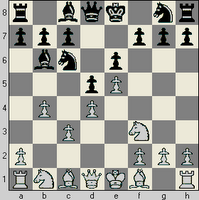
7. b5
If not the bishop, hassle the knight. I know I am probably violating opening principles by making all these pawn moves and ignoring piece development - but I can't resist the temptation.
7. ...Nce7
8. Ng5
I move here just because I can. It will annoy black and threaten the f7 square, especially if I can follow up with 9. Qf3.
8. ...h6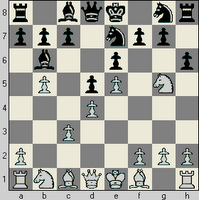
With 8. Ng5 I didn't even think to consider what black's response would be - I'm still very much playing like a beginner! I was annoyed at moving the knight there only to have to move it a second time to safety. It was at this point I found something interesting that I had not planned for at all.
9. Qh5!?
Threatening the f7 square with the queen. Black can now take the knight with the pawn, but he is loath to give up the rook after 9. ...hxg5 10. Qxh8.
9. ...Nf5??
Just about the worst move black could make since the d7 flight square will be lost with the displacement of the knight from e7.
10. Qxf7#
P.S. In the 1979 tournament I checkmated my last opponent in 12 moves - a bit surprising considering my opponent had won his previous 3 games. In this tournament I checkmated my last opponent, who also won his first three games, in only 10 moves. It was SPOOKY that I won so quickly because it felt exactly like a moment in time had repeated itself. Unfortunately I cannot credit any great skill or technique on my part in either win – it really was more a case of my opponents losing their games :-)
Posted by
Rook Van Winkle
at
11:00 AM
0
comments
![]()
Labels: Chess Events, Game Analysis, My Games, novice, Replay Moves, Tournaments
Sunday, September 24, 2006
Kramnik Takes a 2-0 Lead Over Topalov
 See the Susan Polgar Chess Blog for the best up-to-date coverage of the 2006 World Chess Championship Match and check out her analysis of game one and game two. You can also get live coverage of the match at the Internet Chess Club or official coverage at FIDE.
See the Susan Polgar Chess Blog for the best up-to-date coverage of the 2006 World Chess Championship Match and check out her analysis of game one and game two. You can also get live coverage of the match at the Internet Chess Club or official coverage at FIDE.
Hopefully, Topalov will rebound just as Bobby Fischer did when he was down 2-0 back in 1972. I'm pulling for Topalov (Bulgarian) over Kramnik (Russian) simply on the principle that the Russians have dominated chess much too long :-)
Posted by
Rook Van Winkle
at
8:45 AM
0
comments
![]()
Labels: Chess News, FIDE, World Championship
Friday, September 22, 2006
What World Chess Championship?
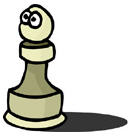 "In what is regarded as the most important match for 13 years, Veselin Topalov and Vladimir Kramnik will face each other across a board for the right to be undisputed world chess champion."
"In what is regarded as the most important match for 13 years, Veselin Topalov and Vladimir Kramnik will face each other across a board for the right to be undisputed world chess champion."
And yet there is absolutely zero coverage by the American media! Fortunately, there are alternatives sources for information on the match - but anyone outside of the world of chess will know nothing about it. How sad.
For those in the know, here at least is a good article on the match at www.timesonline.co.uk.
P.S. Rook has been tied up in a new home purchase - but lots of new material coming soon...
Posted by
Rook Van Winkle
at
5:23 PM
0
comments
![]()
Labels: Chess News, World Championship
Sunday, September 17, 2006
Chess Improvement Plan - Part One: Goals
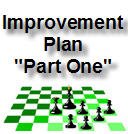 Chess: The cerebral frontier. These are the voyages of the patzer, Rook Van Winkle. His never ending mission to explore the strange world of chess, to seek out new tactics and odd openings, to boldly move where no pawn or piece has gone before...
Chess: The cerebral frontier. These are the voyages of the patzer, Rook Van Winkle. His never ending mission to explore the strange world of chess, to seek out new tactics and odd openings, to boldly move where no pawn or piece has gone before...
I was just working on a brief statement defining my overall goal in undertaking my chess improvement plan and somehow Star Trek popped into my mind.
But now let me be serious. My "About Me" section describes why I have gotten back into chess after all these years - so I won't repeat that. What I need is a simple statement describing why I want to become a better chess player.
Ultimate Goal: To become a better chess player in order to enjoy the game better.
I don't want to set any artificial goals such as a) I will become an Expert Level Player before I die, or b) I will win 75% of all the games I play, or c) I will complete 5000 tactical problems in five minutes.
The better I am and the more I know about chess the better I will a) appreciate my games and the games of others (amateur and master alike) b) grasp the nuances of the openings, middle, and end games and c) derive satisfaction from every hard fought well-played game that I play - win or lose.
Obviously, concerning item c), the stronger I am as a chess player the more likely I can offer myself and my opponent a hard fought well-played game :-)
My Specific Goals:
These are based mainly on recommendations by Dan Heisman, Susan Polgar's advice to Emily Liu at Emily's Chess Blog, and other suggestions I've come across from other chess player's chronicling their own chess improvement plans.
- Play at least one game of chess per day.
- Improve my knowledge and utilization of chess tactics and set aside time each day to practice those tactics - even if only 15 minutes per day to start.
- Pick one opening to specialize with when playing white and learn it well.
- Learn two good openings as black to use against 1.e4 and 1.d4.
- Improve my understanding of endgame positions.
- Improve my understanding of middle game strategies.
- Improve my time management during a game, i.e. slow down and make the most use of the time allocated.
- Learn not to always recklessly attack but to play defensively when the situation requires it. (This is a particularly bothersome deficiency of mine)
- Annotate my own games immediately after playing them – especially my losses in order to learn from my mistakes
- Get more practice at recording my moves in algebraic notation.
- Get more practice playing games with a chess clock.
- Observe some annotated games of the top rated players.
Some possible additional long term goals :
- Have a basic recognition of all the major openings by name, their first few defining moves, and the resulting board positions or "tabiyas".
- Become familiar with some of the classic games of the "masters" past and present.
- Read (and hopefully learn from) some of the classic books on chess.
- Teach other novices, kids and adults, the basic of playing chess.
That ends my initial list of goals - although I may come back to them later to add, delete, or re-order them.
Posted by
Rook Van Winkle
at
12:06 PM
0
comments
![]()
Labels: advice, Chess Training, Improvement Plan
Saturday, September 16, 2006
"The Mad Genius of Bobby Fischer" Cable TV Special
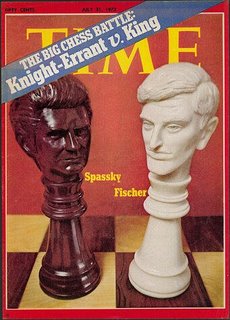
PROGRAM LISTING
The Mad Genius of Bobby Fischer - Repeat. "The tactics Bobby Fischer used to become
one of the world's best chess players."
... is showing on the Game Show Network (GSN) ON September, 23rd from 9:00 AM - 10:00 AM EDT. You can find the GSN channel and program guide for your region here.
I probably watch TV less than 98% of the American population - maybe about 4 or 5 hours per week. However, because we have a Microsoft Media Center PC I can search the program guide for the word "chess" - which is how I came across the program when it aired back in August. It is now being repeated if you care to see it.
Needless to say, the show is less about chess than it is about the tragic life of the man himself. However, I did find the show interesting because there was a lot of video of Bobby Fischer playing chess from his early career up to the point when he abandoned serious play. The other great thing about the show is that they interview many famous US chess personalities. After hearing some of these names mentioned for years and years it was nice to actually match their names up with faces.
The 2nd half of the show had a lot of coverage (and video) too but it was less interesting from a chess perspective and probably of more interest to behavioral psychologists.
Whatever one thinks about Bobby Fischer, with all of his appalling behaviour and hateful invective, he did inspire a whole generation to get involved chess and made the game an exciting thing for those of us growing up in the fifties, sixties, and early seventies.
NOTE: The picture above is from the Time Magazine covering the 1972 match - which I still own and treasure to this day.
Posted by
Rook Van Winkle
at
10:34 AM
0
comments
![]()
Labels: Bobby Fischer, Chess News, Videos, World Championship
Tuesday, September 12, 2006
Chess D-Day - An Improvement Plan
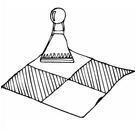 On June 6th of this year I played a game of chess. I can mark that as the day that Rook Van Winkle awoke from his 25-year chess slumber.
On June 6th of this year I played a game of chess. I can mark that as the day that Rook Van Winkle awoke from his 25-year chess slumber.
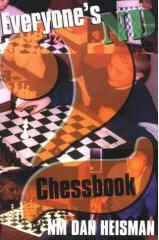 Sidebar - To be honest, I also have to give some credit here to Dan Heisman. He is the host of the ICC’s radio show “Ask the Renaissance Man”, writes the “Novice Nook” column at ChessCafe.com, and is the author of the remarkable book “Everyone’s 2nd Chess Book”. So far I have only perused his book (I’ll write a full review of it once I’ve read it all). By following the list of guidelines in his book I’ve seen a tremendous improvement in my game. Thank you, Dan Heisman. Take this advice: If you are a chess novice or a low rated experienced player you must really buy this book. You will not regret it.
Sidebar - To be honest, I also have to give some credit here to Dan Heisman. He is the host of the ICC’s radio show “Ask the Renaissance Man”, writes the “Novice Nook” column at ChessCafe.com, and is the author of the remarkable book “Everyone’s 2nd Chess Book”. So far I have only perused his book (I’ll write a full review of it once I’ve read it all). By following the list of guidelines in his book I’ve seen a tremendous improvement in my game. Thank you, Dan Heisman. Take this advice: If you are a chess novice or a low rated experienced player you must really buy this book. You will not regret it.As a former teacher, I know the importance of a curriculum. My very first step then is to design my personal chess curriculum. To begin, I need to complete some tasks. For now I will simply list these tasks. Later I will follow up on each of them with more detailed posts:
- Define my goals. What is it that I personally want to accomplish with my chess improvement plan? How will I measure my progress?
- List of the chess resources I already have and those I may wish to add:
- Books I already own
- Books I may wish to purchase
- Software I already own
- Software I might wish to purchase
- Helpful Internet resources I can use
- My chess history – what score sheets and PGN records of my games do I have?
- Plan an agenda using selected resources from my list.
- Implement a schedule for study and game playing.
- Follow through conscientiously with my plan and see what
happens.
Posted by
Rook Van Winkle
at
12:00 PM
2
comments
![]()
Labels: advice, Chess Training, Improvement Plan, novice
Friday, September 08, 2006
Listen to the KQED Radio Interview with the Author of the "The Immortal Game"
 Michael Krasny discusses the intersection of chess, war, art and science with David Shenk, author of "The Immortal Game: A History of Chess."
Michael Krasny discusses the intersection of chess, war, art and science with David Shenk, author of "The Immortal Game: A History of Chess."
Host: Michael Krasny
Guests: David Shenk, author of The Immortal Game: A History of Chess, or How 32 Carved Pieces on a Board Illuminated Our Understanding of War, Art, Science, and the Human Brain
Posted by
Rook Van Winkle
at
11:18 AM
0
comments
![]()
Labels: Chess Books, Chess News
Thursday, September 07, 2006
Mystery Chess Set
Yesterday I came across a picture of an English "Barleycorn" chess set. Suddenly, my memory was jogged. I seemed to recall a somewhat similar set that my grandmother once had. It was part of a collection of games she had brought from Scotland when she moved to America in the 1920's. Checking with my family it turns out that my brother had latched on to it - and he was kind enough to supply a picture of it which you can view above.
They are very inexpensive light wood pieces. They are not weighted and do not have felt bottoms. There was never a chess board (that we know of) that went with it.
Doing a little research, I have come across somewhat similar sets on the web. The House of Staunton calls them "Pre-Staunton Sets." Evidently this style was quite popular in Great Britain and Germany in the 19th and early 20th century before losing out to the more standard Staunton design. But what do I call it? An English Barleycorn? A French Regence? Or perhaps a St. George or a Calvert design?
Any comments would be appreciated...
Posted by
Rook Van Winkle
at
5:37 AM
2
comments
![]()
Labels: Chess Art, Chess Sets, Chess Trivia
Tuesday, September 05, 2006
The World Chess Championship 2006 or What Ever Happened to Dr. Zukhar?
 Having recently come back to chess, I’m greatly looking forward to following my first major chess championship since 1978. I got a chuckle recently reading an old Time Magazine clipping I saved concerning that match – the one between Korchnoi-Karpov-Zukhar. I of course jest here concerning Dr. Zukhar – but at the time he seemed to be as much a part of the contest as the players themselves.
Having recently come back to chess, I’m greatly looking forward to following my first major chess championship since 1978. I got a chuckle recently reading an old Time Magazine clipping I saved concerning that match – the one between Korchnoi-Karpov-Zukhar. I of course jest here concerning Dr. Zukhar – but at the time he seemed to be as much a part of the contest as the players themselves.
As a refresher to the 1978 match, let me quote from Wikipedia’s entry on Anatoly Karpov:
In 1978, Karpov's first title defence was against Viktor Korchnoi, the opponent he defeated in the previous Candidates tournament. The situation was vastly different from the previous match, because in the intervening years Korchnoi had defected from the Soviet Union. The match was played in Baguio in the Philippines, and a vast array of psychological tricks were used during the match, from Karpov's Dr. Zukhar who allegedly attempted to hypnotize Korchnoi during the game, to Korchnoi's mirror glasses to ward off the hypnotic stare, Korchnoi's offering to play under the Jolly Roger flag when he was denied the right to play under Switzerland's, to Karpov's yogurt supposedly being used to send him secret messages, to Korchnoi inviting two local cult members (on trial for attempted murder) into the hall as members of his team.
Now I’m not sure this latest match will be as entertaining off the board as that match was, but it does look to be interesting.
Check out the excellent article Who will win the Topalov-Kramnik world championship? at Chessbase.com.
If you read only one article on the match, this should be the one. It presents an excellent background to the match, especially helpful to people like me who have been away from chess or for new players just taking up the game. The article also explains the match format, provides player’s biographies, and even speculates who will win the match. Best of all, it concludes with a complete “Schedule of the World Chess Championship 2006” which you can copy and paste somewhere so you don’t miss a game. Highly recommended.
Posted by
Rook Van Winkle
at
12:33 PM
0
comments
![]()
Labels: Chess Events, Chess News, World Championship
Monday, September 04, 2006
Chess on the Web - Installment One
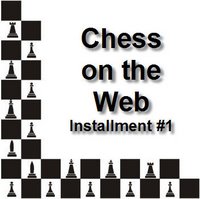 Bill Gates once said [at least I think he did] the ultimate goal of technology would be to have all the world's "information at your fingertips." We seem to be getting there at an alarming pace, especially as concerns information on the Internet. The exponential growth of this information is mind boggling.
Bill Gates once said [at least I think he did] the ultimate goal of technology would be to have all the world's "information at your fingertips." We seem to be getting there at an alarming pace, especially as concerns information on the Internet. The exponential growth of this information is mind boggling.
Which brings me to the topic of chess resources on the web. Where do I begin? There are so many great resources it is impossible even to list them all. What's worse is that nearly every site leads you on to another and another and another… so I will show some much needed restraint here and limit myself to mentioning (every so often) several fantastic Internet chess destinations you definitely must visit.
Today I would like to mention three "chess blogs":
- Getting into Chess "A beginner's Journey into the complex world of chess."
This blog was one of the first to catch my eye - since the writer of this blog is on a journey very similar to that of yours truly, Rook Van Winkle. If you too have decided it's time to give chess a try I think you'll find a lot of interesting reading here and lots of links to good information. - Chessola - "The David Moody Chess LiveJournal."
I just recently discovered this site by a fellow Michigander. It appears to have an incredible list of very interesting games of all types and at all levels of play. David provides a lot of entertaining commentary on each of the games. In fact, he is on a mission to preserve thousands of chess games "from average players" played in Michigan tournaments over the last 20 or 30 years. Amazingly he has built up a database of 27,000 of these games! I wonder if he has any score sheets from "The 2nd Annual Pontiac Open - Unrated Section" held in Rochester, Michigan in December of 1979? As you can read in an earlier post, that's was the only chess tournament I had ever played in until just this past July. I am fortunate to have score sheets from the first and last of my games, but not the second and third. - Susan Polgar's Chess Blog "The Official Chess Blog of Susan Polger - The #1 female player in the US and #2 rated in the world."
This is one incredibly good chess blog. Susan has it constantly updated with recent chess news, recent events and games, chess problems and puzzles. She also includes a lot of inspirational articles about young players and has published a number of student written essays. It is worth checking every day because there is always something new. In fact, she is so up-to-date she seems to have the scoop on all the latest events in the chess world before any other of the "chess news" sites get around to publishing them. She is also one of our greatest American "chess ambassadors" promoting the game as a very worthwhile activity, not only for women and girls, but for young and old alike.
Posted by
Rook Van Winkle
at
11:12 AM
2
comments
![]()
Labels: advice, Chess Blog, Chess Web Sites, Rave, Review
ABC News: How Chess Can Help Stave Off Alzheimer's

I was glad to see the game of chess getting some good press this morning - or any kind of press for that matter :-) - on the September 4, Labor Day edition of ABC's "Good Morning, America."
The lead in to the segment was "It is one of the most beloved games in the world... and it [may help] to prevent Alzheimer’s disease..."
The interview was with best-selling author David Shenk, who has written a new book on the history of chess titled "The Immortal Game." He has also written a book on Alzheimer's disease. When asked about the connection between the two he responded:
"Everyone in the Alzheimer's community is searching for a way to prevent Alzheimer's and it turns out that one important way - it's not a sure fire way - but you need to use your brain. As you get older, particularly, you need to exercise your brain in any way and the more exercise you get in your brain - it's just like keeping fit and keeping your body fit - the better off you are, the better chance you stand for preventing diseases like Alzheimer's.”
“Chess turns out to be a particularly good brain builder for this..."
Here's an excerpt from the http://www.abcnews.com/ web site:
How Chess Can Help Stave Off Alzheimer's
Writer David Shenk Traces the History of Chess in 'The Immortal Game'
Sept. 4, 2006 — In a wide-ranging examination of chess, David Shenk uncovers the hidden history of a game that was invented in India around 500 A.D. and seems more popular than ever today.
From its enthusiastic adoption by the Persians and its spread by Islamic warriors, to its 21st century importance to the development of artificial intelligence and use as a teaching tool in inner-city America, chess has been a omnipresent factor in the development of civilization.
Research shows that brain is much like the body — it needs continual activity to remain strong and supple and fight off the predations of old age. And researchers have determined that chess is uniquely well-suited to "exercising" the brain. It is simple to play, but offers nearly limitless variation.
It requires memory, problem-solving skills, abstract thought, and creativity. And it turns out that the people who play it regularly in their older years — along with related activities like crossword puzzles — are less likely to develop Alzheimer's and related conditions.
You can read the entire article and an excerpt for Shenk's new book "The Immortal Game" here: How Chess Can Help Stave Off Alzheimer's.
The author's website can be found here: "The Immortal Game"
The book can be ordered here: The Immortal Game: A History of Chess, or How 32 Carved Pieces on a Board Illuminated Our Understanding of War, Art, Science and the Human Brain (Hardcover) by David Shenk
Posted by
Rook Van Winkle
at
9:36 AM
0
comments
![]()
Labels: Benefits of Chess, Brain Health, Chess Books, Chess News
